- Home
- Robert E. Howard
Gardens of Fear
Gardens of Fear Read online
Table of Contents
COPYRIGHT INFORMATION
MYTHOLOGY FROM A TYPEWRITER
QUEEN OF THE BLACK COAST
THE HAUNTER OF THE RING
THE GARDEN OF FEAR
THE DEVIL IN IRON
THE VOICES WAKEN MEMORY
THE PEOPLE OF THE BLACK CIRCLE
A WITCH SHALL BE BORN
GARDENS OF FEAR
THE WEIRD WORKS OF ROBERT E. HOWARD, VOLUME 6
ROBERT E. HOWARD
EDITED BY PAUL HERMAN
INTRODUCTION BY BENJAMIN SZUMSKYJ
COPYRIGHT INFORMATION
Copyright © 2006 by Paul Herman.
Cover art copyright © 2006 by Stephen Fabian.
All rights reserved.
Published by Wildside Press LLC
www.wildsidepress.com
MYTHOLOGY FROM A TYPEWRITER
“Mythologies . . . seduce us into walking the border between what exists and what we think might exist, remind[ing] us that ‘truth’ is not an objective but a subjective phenomenon, that in terms of our humanity, what we imagine is just as important as what we know.”
—Kenneth McLeish (1940–1997)
* * * *
The history of literature can be cruel.
With the stroke of a quill, the driving of a key or the crawl of a pen, any number of characters are created to map a world either familiar or new to us. They are made to experience events and to undergo emotions, through lives that breathe with a variety of themes that humanise even the most fantastic of creations. And readers are engulfed by those that are larger than life. This is the point where the cruelty of which I speak begins, because, in many cases, the characters are so much larger than life that they escape the life of their creator. In some instances, the “writing demon” (as Fritz Leiber put it) has the artists using the very fabric of their body as a means to put flesh on the characters and, in doing so, they become a ghost in comparison.
Such is the fate of Robert E. Howard.
It would, however, be unfair to state that there has not been a consciously and passionately driven effort to counter this outlook. The publication of critical anthologies and academic journals, and the cinematic adaptation of Novalyne Price Ellis’ memoir, One Who Walked Alone (released as The Whole Wide World, starring both Vincent D’Onofrio and Renée Zellweger) have sought to cure the curse of Howard’s legacy.
For Robert E. Howard is, as many fans, students and scholars of Howard’s work attest, a “lost” American classic, rising to stand beside such figures as Jack London, Hemingway, Faulkner, and Poe. While his correspondent and friend, H. P. Lovecraft, has found his place in the modern classics, and has begun to be studied in universities, Howard remains an author whose legacy has been corrupted by both adaptation and pastiche, constructing an erroneous portrait of both himself as the lone Texan, and of his many fantastic worlds. The winds may be changing, but in a slow, frustrating manner.
All literature comes under the banner of a unique mythos. Howard’s own literary output includes historical fiction, sports stories, westerns, the detective tale, and the “weird tale.” In The Modern Weird Tale (1990) S. T. Joshi states that the “weird tale” exists as “the consequences of a world view . . . in accordance with [the authors’] philosophical predispositions [and] their metaphysical, ethical, and aesthetic theories.” This includes “fantasy, supernatural horror, non-supernatural horror, and quasi-science fiction.” Yet, fantasy exists in more genres than one would suspect — is not all fiction fantastic to begin with? Even the so-called “realistic” authors present us with their own particular, often odd or unusual, perception of reality. Fantasy embodies the development of the past and evolution into the future; it is a suspension of reality and a glimpse of the unknown. Fantasy does not necessarily embody something that can’t be true; quite the opposite: fantasy can present us with truths that appeal to our naked soul, and, after all, for untold centuries, both the oral tradition and the world’s dominant narrative modes (myths, epics, folktales, legends, and even so-called “histories”) have been fantastic.
Robert E. Howard not only became a part of modern literary mythology, he wrote a mythology himself, from which we were not only entertained, but learned, in turn, more about ourselves. Mythology is an interpretation of a history, by which fiction and human or moral values accompany the narrative, becoming the fundamental core of a worldview, and existing through the generations. Thus, as an example of this, The Iliad is a combination of history, fiction and human or moral values, in the fall of Troy, the gods, and the themes of love, betrayal, heroism, all told as a story that reflects the Hellenic worldview, whose culture in turn gave birth to the myth itself. Therefore, since everything has a history and can include an act, belief, event, place or person, it encompasses a larger school of thought than the traditional outlook of the myth as a mere fiction involving deities and heroes.
As stated in my editorial to the third issue of Studies in Fantasy Literature, themes are universal, as are the emotions we share. When reading fantasy, this is no different—it is composed of a variety of philosophical elements, and structured in such a manner as to uphold a particular ideology, connecting it more closely to the values and beliefs of our own world. As such, then, literature could easily be considered mythology. That fantasy literature can be redefined as modern mythology may not be as difficult to imagine as one may believe, since all literature comes beneath the banner of a unique mythos. In reply to Michael Moorcock’s plea for a new name for heroic fantasy, in “Putting a Tag On It” (Amra, vol. 2, no. 16, 1961), Harry Warner proposed the term “modern mythology.” Though never formally adopted, it resonated within me.
Barbour, in Myths, Models and Paradigms: The Nature of Scientific and Religious Language (1974), broke down mythology into five distinct areas. First, myths offer ways of ordering existence, therefore constructing a worldview that makes sense of their place in the cosmos. Second, myths inform humanity about itself, enabling people to structure a meaning as to from whence they came, and as to what makes them who they are. Third, the myths express a saving power in human life, where a bridge between the “actual” and the “ideal” in the human condition is established. Fourth, they provide patterns for human actions, “encouraging particular forms of behaviours and implicitly embody[ing] ideal goals and judgements of value.” Fifth, and finally, myths are enacted in rituals, which are the process or means that operate to link this world with another, and either accompanies or encodes a mythology. In my opinion, reading a book involves such a ritual. Although it would be foolish of me to fully present such a thesis within an introduction, such a concept allows one to begin to approach literature in new, and different manner.
As such, then, the stories of Robert E. Howard connect us to the past. His literary mythology is not merely meant to entertain, since no real literature merely fills the reader’s desire. There is an old saying: books are the “world carried in the hand,” and this is readily apparent in Howard’s case. The stories, then, in this volume are excellent examples of the literary mythology of which I speak. Through them, Howard creates and disseminates his myths, his worldview. There is something, further, within such stories that connects the reader’s personal, spiritual, philosophical, and psychological values and beliefs with Howard’s written word; it is an odyssey of the mind.
Of the stories included in this volume, a mythological outlook can be adopted. “Queen of the Black Coast” is undoubtedly one of Howard’s finest Conan stories, for it gives the reader insights into what would be Conan’s closest approach to the emotion of love that he would ever experience, and the deep-rooted feelings of a lone Texan for a woman that he had long sought in life. Following the lead of scholar Dirk W. Mosig,
a Jungian reading would reveal this story to be a psychological odyssey for Howard. It taps into the collective unconscious to reveal to us the primal emergence of the Self, among other “innate axial systems, gaining power and consistency from actual experiences in each individual’s lifetime” (“‘The White Ship’: A Psychological Odyssey”).
“The Haunter of the Ring” follows the detective exploits of Conrad and Kirowan, and the unveiling of Thoth-Amon’s mystical ring, last seen in the Conan story “The Phoenix on the Sword.” As noted, such a story merges the past with the future and has the reader remembering the treasures of hallowed antiquity in an elegiac manner. It reminds us, too, that the consequences of using unconventional means to reclaim what was lost to us, or to relive that which is locked in the memories of the past, is a passage that few dare undergo and endure.
The Pentateuch-themed “The Garden of Fear” explores reincarnation, anthropology, theology and evolution, through the quest of James Allison as Hunwulf, living a life that was once his own. Archetypes and symbolism construct a body of work in which the heart of Hunwulf seeks to complete the fire in his soul, by reuniting with his beloved Gudrun.
“The Devil in Iron,” to which most critics offer a lukewarm response, is read best as a preamble to the Conan saga. If one enjoys the enchantment of Hyboria, the villainy of Khosatral Khel, the innocence of Octavia, and the sword-clashing overture of the story, then the reader should similarly enjoy the other Conan stories, which are enriched with greater depth and meaning. Although formulaic, this story has readers intoxicated by what the Cimmerian’s adventures necessitate.
The poem, “The Voices Waken Memory,” spotlights a haunted narrator, cursed with blindness by the gods, who must endure the horrors of existence through the sounds of living darkness. Expressionism looms over each line of Byronic despair.
The novella “The People of the Black Circle” is interesting in that it deals exclusively with a cultural background unique to the Conan saga and pays homage to one of Howard’s literary influences, the charismatic Talbot Mundy. Conan is, refreshingly, a player in the events that structure this engaging battle of magic, rather than being the centre of attention. The concept of magic in Howard’s works, which is central here, has been neglected for decades and is worthy of future study. Significantly, Frazer’s definition of magic from The Golden Bough (1911) is favourable, when he writes that magic involves “mistaken applications of one or other of two great fundamental laws of thought, namely, the association of ideas by similarity and . . . by contiguity in space or time.”
The pagan drama “A Witch Shall Be Born” is a bountiful excavation of classic mythology, history and religion. The powerful signature of Howard’s philosophical battle between civilisation and barbarism is seen poetically here, culminating in what is surely one of the greatest scenes to ever occur in the Conan saga: the crucifixion of the Cimmerian. In reading a story such as this, we can begin to see why Howard favoured humanity’s past, rather than the unchronicled future.
So, avid reader, prepare yourself for the journey you are about to embark upon, and read a mythology that Howard painted with broad strokes from a palette which held a spectrum of history, philosophy, and imagination. Witness how Howard rendered flesh on the ghosts of history’s past, for example. And, as detailed in Joseph Campbell’s The Hero With A Thousand Faces (1949), in returning from the mythic quest, the hero’s “Freedom to Live” entails a knowledge that was once unknown. Enjoy the quest within these pages, then, fellow reader, and return with something of meaning as your rightful reward.
— Benjamin Szumskyj
Melville, Western Australia, 2005
QUEEN OF THE BLACK COAST
Weird Tales, May 1934
1. Conan Joins the Pirates
Believe green buds awaken in the spring,
That autumn paints the leaves with somber fire;
Believe I held my heart inviolate
To lavish on one man my hot desire.
—The Song of Bêlit.
* * * *
Hoofs drummed down the street that sloped to the wharfs. The folk that yelled and scattered had only a fleeting glimpse of a mailed figure on a black stallion, a wide scarlet cloak flowing out on the wind. Far up the street came the shout and clatter of pursuit, but the horseman did not look back. He swept out onto the wharfs and jerked the plunging stallion back on its haunches at the very lip of the pier. Seamen gaped up at him, as they stood to the sweep and striped sail of a high-prowed, broad-waisted galley. The master, sturdy and black-bearded, stood in the bows, easing her away from the piles with a boat hook. He yelled angrily as the horseman sprang from the saddle and with a long leap landed squarely on the mid-deck.
“Who invited you aboard?”
“Get under way!” roared the intruder with a fierce gesture that spattered red drops from his broadsword.
“But we’re bound for the coasts of Cush!” expostulated the master.
“Then I’m for Cush! Push off, I tell you!” The other cast a quick glance up the street, along which a squad of horsemen were galloping; far behind them toiled a group of archers, crossbows on their shoulders.
“Can you pay for your passage?” demanded the master.
“I pay my way with steel!” roared the man in armor, brandishing the great sword that glittered bluely in the sun. “By Crom, man, if you don’t get under way, I’ll drench this galley in the blood of its crew!”
The shipmaster was a good judge of men. One glance at the dark scarred face of the swordsman, hardened with passion, and he shouted a quick order, thrusting strongly against the piles. The galley wallowed out into clear water, the oars began to clack rhythmically; then a puff of wind filled the shimmering sail, the light ship heeled to the gust, then took her course like a swan, gathering headway as she skimmed along.
On the wharfs the riders were shaking their swords and shouting threats and commands that the ship put about, and yelling for the bowmen to hasten before the craft was out of arbalest range.
“Let them rave,” grinned the swordsman hardly. “Do you keep her on her course, master steersman.”
The master descended from the small deck between the bows, made his way between the rows of oarsmen, and mounted the mid-deck. The stranger stood there with his back to the mast, eyes narrowed alertly, sword ready. The shipman eyed him steadily, careful not to make any move toward the long knife in his belt. He saw a tall powerfully built figure in a black scale-mail hauberk, burnished greaves and a blue-steel helmet from which jutted bull’s horns highly polished. From the mailed shoulders fell the scarlet cloak, blowing in the sea-wind. A broad shagreen belt with a golden buckle held the scabbard of the broadsword he bore. Under the horned helmet a square-cut black mane contrasted with smoldering blue eyes.
“If we must travel together,” said the master, “we may as well be at peace with each other. My name is Tito, licensed master-shipman of the ports of Argos. I am bound for Cush, to trade beads and silks and sugar and brass-hilted swords to the black kings for ivory, copra, copper ore, slaves and pearls.”
The swordsman glanced back at the rapidly receding docks, where the figures still gesticulated helplessly, evidently having trouble in finding a boat swift enough to overhaul the fast-sailing galley.
“I am Conan, a Cimmerian,” he answered. “I came into Argos seeking employment, but with no wars forward, there was nothing to which I might turn my hand.”
“Why do the guardsmen pursue you?” asked Tito. “Not that it’s any of my business, but I thought perhaps—”
“I’ve nothing to conceal,” replied the Cimmerian. “By Crom, though I’ve spent considerable time among you civilized peoples, your ways are still beyond my comprehension.
“Well, last night in a tavern, a captain in the king’s guard offered violence to the sweetheart of a young soldier, who naturally ran him through. But it seems there is some cursed law against killing guardsmen, and the boy and his girl fled away. It was bruited about that I w
as seen with them, and so today I was haled into court, and a judge asked me where the lad had gone. I replied that since he was a friend of mine, I could not betray him. Then the court waxed wroth, and the judge talked a great deal about my duty to the state, and society, and other things I did not understand, and bade me tell where my friend had flown. By this time I was becoming wrathful myself, for I had explained my position.
“But I choked my ire and held my peace, and the judge squalled that I had shown contempt for the court, and that I should be hurled into a dungeon to rot until I betrayed my friend. So then, seeing they were all mad, I drew my sword and cleft the judge’s skull; then I cut my way out of the court, and seeing the high constable’s stallion tied nearby, I rode for the wharfs, where I thought to find a ship bound for foreign parts.”
“Well,” said Tito hardily, “the courts have fleeced me too often in suits with rich merchants for me to owe them any love. I’ll have questions to answer if I ever anchor in that port again, but I can prove I acted under compulsion. You may as well put up your sword. We’re peaceable sailors, and have nothing against you. Besides, it’s as well to have a fighting-man like yourself on board. Come up to the poop-deck and we’ll have a tankard of ale.”
“Good enough,” readily responded the Cimmerian, sheathing his sword.
The Argus was a small sturdy ship, typical of those trading-craft which ply between the ports of Zingara and Argos and the southern coasts, hugging the shoreline and seldom venturing far into the open ocean. It was high of stern, with a tall curving prow; broad in the waist, sloping beautifully to stem and stern. It was guided by the long sweep from the poop, and propulsion was furnished mainly by the broad striped silk sail, aided by a jibsail. The oars were for use in tacking out of creeks and bays, and during calms. There were ten to the side, five fore and five aft of the small mid-deck. The most precious part of the cargo was lashed under this deck, and under the fore-deck. The men slept on deck or between the rowers’ benches, protected, in bad weather, by canopies. With twenty men at the oars, three at the sweep, and the shipmaster, the crew was complete.

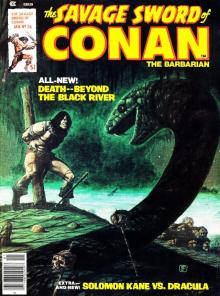 Beyond the Black River
Beyond the Black River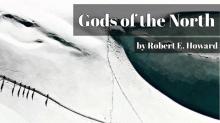 Gods of the North
Gods of the North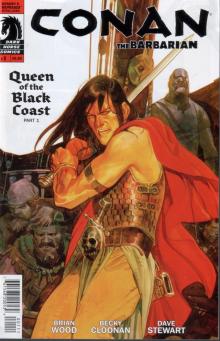 Queen of the Black Coast
Queen of the Black Coast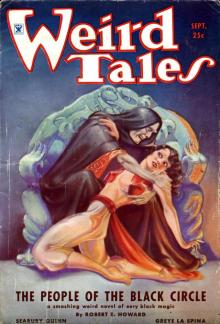 The People of the Black Circle
The People of the Black Circle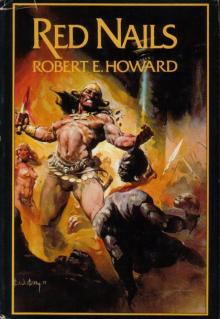 Red Nails
Red Nails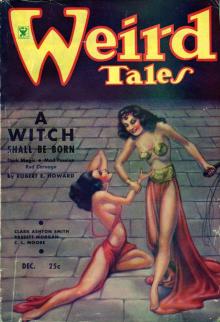 A Witch Shall Be Born
A Witch Shall Be Born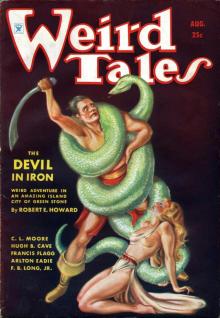 The Devil in Iron
The Devil in Iron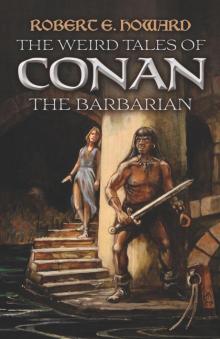 The Weird Tales of Conan the Barbarian
The Weird Tales of Conan the Barbarian The Bloody Crown of Conan
The Bloody Crown of Conan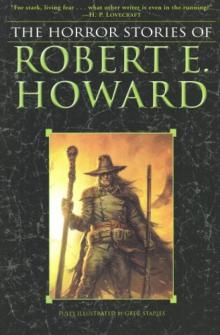 The Horror Stories of Robert E. Howard
The Horror Stories of Robert E. Howard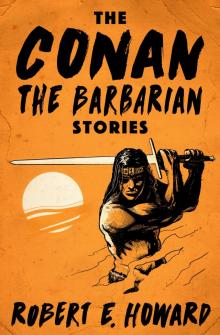 Conan the Conqueror
Conan the Conqueror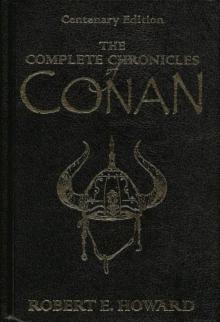 Conan the Barbarian
Conan the Barbarian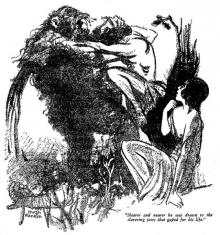 Shadows in the Moonlight
Shadows in the Moonlight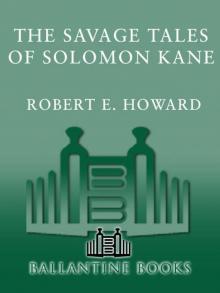 The Savage Tales of Solomon Kane
The Savage Tales of Solomon Kane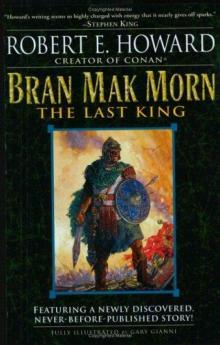 Bran Mak Morn: The Last King
Bran Mak Morn: The Last King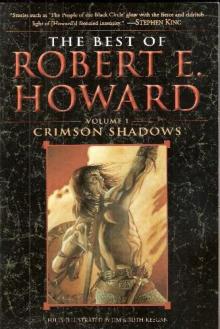 The Best of Robert E. Howard Volume One: Crimson Shadows
The Best of Robert E. Howard Volume One: Crimson Shadows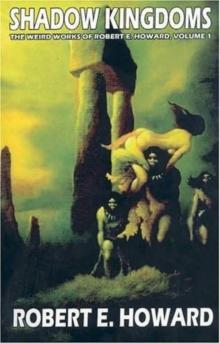 The Best of Robert E. Howard: Crimson Shadows (Volume 1)
The Best of Robert E. Howard: Crimson Shadows (Volume 1)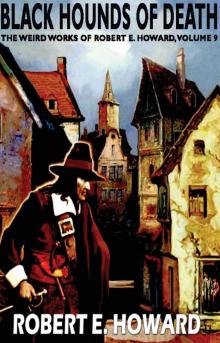 Black Hounds of Death
Black Hounds of Death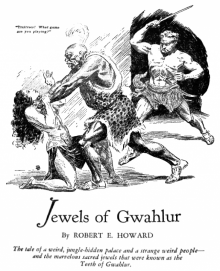 Jewels of Gwahlur
Jewels of Gwahlur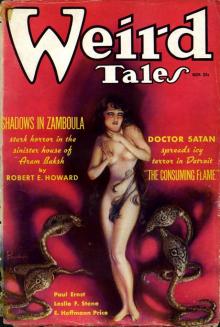 Shadows in Zamboula
Shadows in Zamboula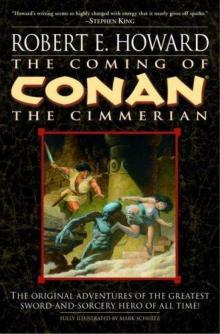 The Coming of Conan the Cimmerian
The Coming of Conan the Cimmerian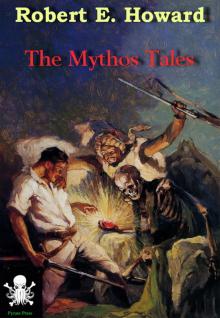 The Mythos Tales
The Mythos Tales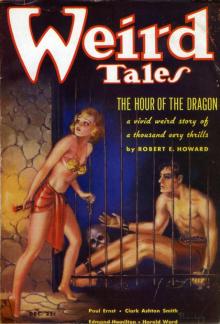 The Hour of the Dragon
The Hour of the Dragon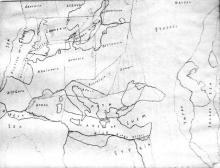 The Hyborian Age
The Hyborian Age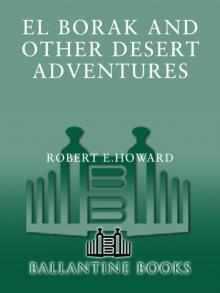 El Borak and Other Desert Adventures
El Borak and Other Desert Adventures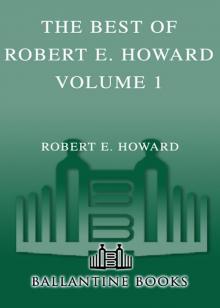 The Best of Robert E. Howard Volume 1 The Best of Robert E. Howard Volume 1
The Best of Robert E. Howard Volume 1 The Best of Robert E. Howard Volume 1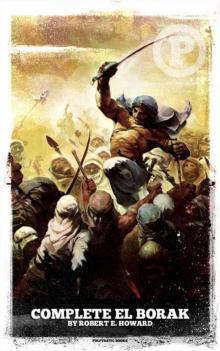 El Borak: The Complete Tales
El Borak: The Complete Tales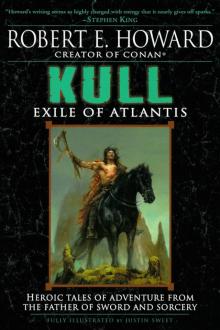 Kull: Exile of Atlantis
Kull: Exile of Atlantis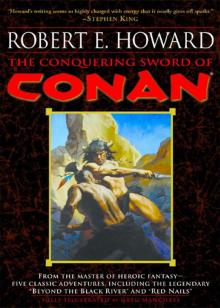 The Conquering Sword of Conan
The Conquering Sword of Conan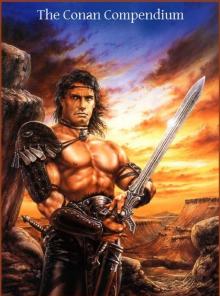 The Conan Compendium
The Conan Compendium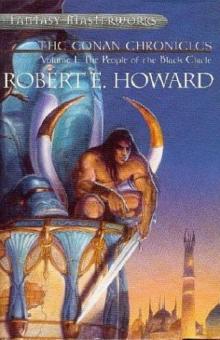 The Conan Chronicles: Volume 1: The People of the Black Circle
The Conan Chronicles: Volume 1: The People of the Black Circle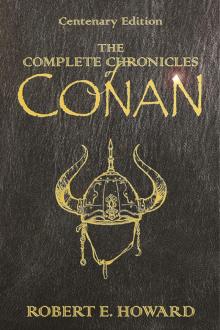 The Complete Chronicles of Conan: Centenary Edition
The Complete Chronicles of Conan: Centenary Edition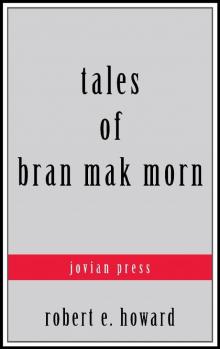 Tales of Bran Mak Morn (Serapis Classics)
Tales of Bran Mak Morn (Serapis Classics)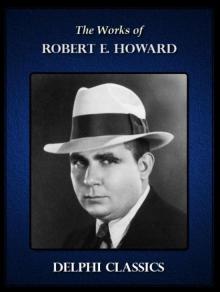 Delphi Works of Robert E. Howard (Illustrated) (Series Four)
Delphi Works of Robert E. Howard (Illustrated) (Series Four)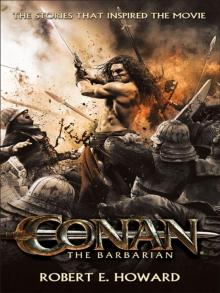 Conan the Barbarian: The Stories That Inspired the Movie
Conan the Barbarian: The Stories That Inspired the Movie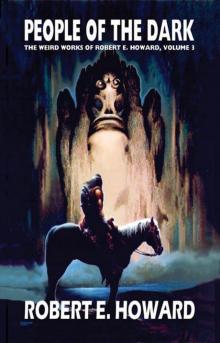 People of the Dark Robert Ervin Howard
People of the Dark Robert Ervin Howard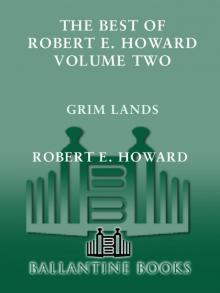 Grim Lands
Grim Lands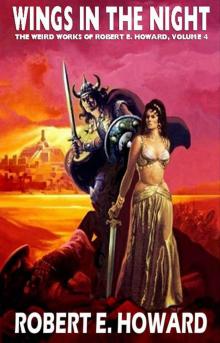 Wings in the Night
Wings in the Night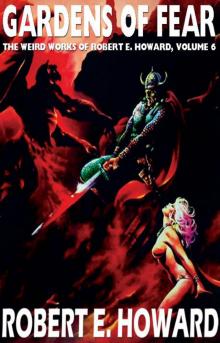 Gardens of Fear
Gardens of Fear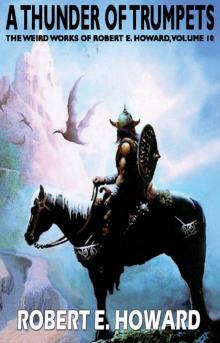 A Thunder of Trumpets
A Thunder of Trumpets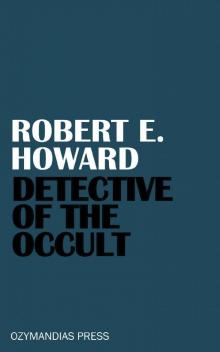 Detective of the Occult
Detective of the Occult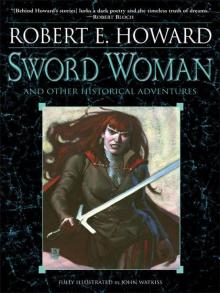 Sword Woman and Other Historical Adventures
Sword Woman and Other Historical Adventures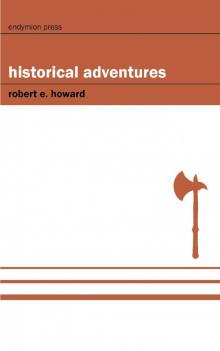 Historical Adventures
Historical Adventures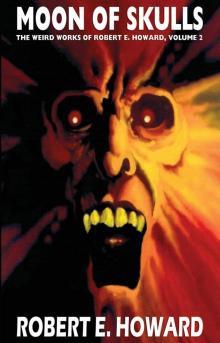 Moon of Skulls
Moon of Skulls The Robert E. Howard Omnibus: 97 Collected Stories
The Robert E. Howard Omnibus: 97 Collected Stories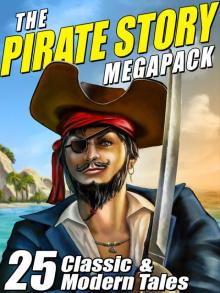 The Pirate Story Megapack: 25 Classic and Modern Tales
The Pirate Story Megapack: 25 Classic and Modern Tales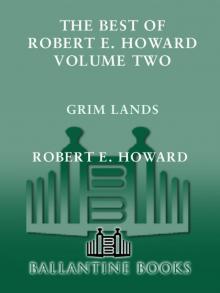 The Best of Robert E. Howard, Volume 2
The Best of Robert E. Howard, Volume 2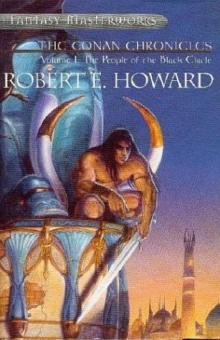 The Conan Chronicles, Vol. 1: The People of the Black Circle
The Conan Chronicles, Vol. 1: The People of the Black Circle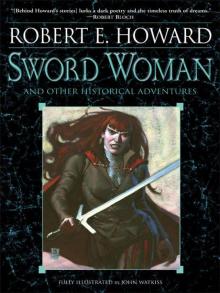 Sword Woman and Other Historical Adventures M
Sword Woman and Other Historical Adventures M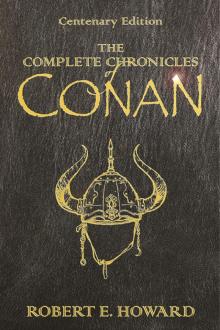 The Complete Chronicles of Conan
The Complete Chronicles of Conan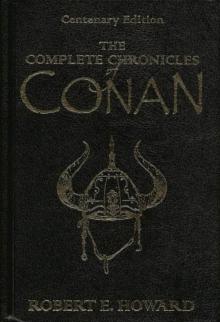 Conan the Barbarian: The Chronicles of Conan (collected short stories)
Conan the Barbarian: The Chronicles of Conan (collected short stories)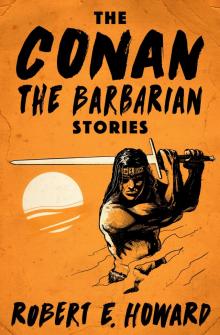 The Conan the Barbarian Stories
The Conan the Barbarian Stories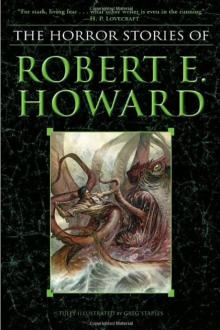 The Best Horror Stories of
The Best Horror Stories of Tigers Of The Sea cma-4
Tigers Of The Sea cma-4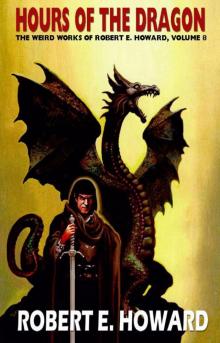 The Hours of the Dragon
The Hours of the Dragon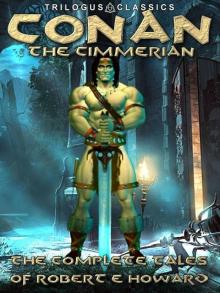 Conan the Cimmerian: The Complete Tales (Trilogus Classics)
Conan the Cimmerian: The Complete Tales (Trilogus Classics)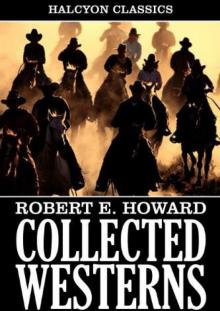 Collected Western Stories of Robert E. Howard (Unexpurgated Edition) (Halcyon Classics)
Collected Western Stories of Robert E. Howard (Unexpurgated Edition) (Halcyon Classics)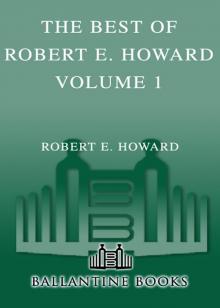 The Best of Robert E. Howard, Volume 1
The Best of Robert E. Howard, Volume 1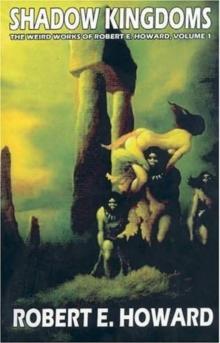 Shadow Kingdoms
Shadow Kingdoms